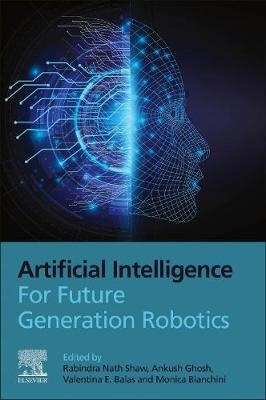
Artificial Intelligence for Future Generation Robotics
Elsevier - Health Sciences Division (Verlag)
978-0-323-85498-6 (ISBN)
Rabindra Nath Shaw is a Senior Member of IEEE (USA), currently holding the post of Director, International Relations, Galgotias University India. He is an alumnus of the applied physics department, University of Calcutta, India. . He has more than eleven years teaching experience in leading institutes like Motilal Nehru National Institute of Technology Allahabad, India, Jadavpur University and others in UG and PG level. He has successfully organised more than fifteen International conferences as Conference Chair, Publication Chair and Editor. He has published more than fifty Scopus/ WoS/ ISI indexed research papers in International Journals and conference Proceedings. He is the editor of several Springer and Elsevier books. His primary area of research is optimization algorithms and machine learning techniques for power system, IoT Application, Renewable Energy, and power Electronics converters. He also worked as University Examination Coordinator, University MOOC’s Coordinator, University Conference Coordinator and Faculty- In Charge, Centre of Excellence for Power Engineering and Clean Energy Integration. Ankush Ghosh is presently working as Associate Professor in the School of Engineering and Applied Sciences, The Neotia University, India. He has more than 15 years of experience in Teaching, research as well as industry. He has outstanding research experiences and published more than 80 research papers in International Journal and Conferences. He was a research fellow of the Advanced Technology Cell- DRDO, Govt. of India. He was awarded National Scholarship by HRD, Govt. of India. He received his Ph.D. (Engg.) Degree from Jadavpur University in 2010. His UG and PG teaching assignments include Microprocessor and microcontroller, AI, IOT, Embedded and real time systems etc. He has delivered Invited lecture in a number of international seminar/conferences, refreshers courses, and FDPs. He has guided a large number of M.Tech and Ph.D. students. He is Editorial Board Member of several International Journals. Valentina Emilia Balas is currently a Full Professor in the Department of Automatics and Applied Software at the Faculty of Engineering, “Aurel Vlaicu University of Arad, Romania. She holds a PhD cum Laude in Applied Electronics and Telecommunications from the Polytechnic University of Timisoara. Dr. Balas is the author of more than 350 research papers. She is the Editor-in-Chief of the 'International Journal of Advanced Intelligence Paradigms' and the 'International Journal of Computational Systems Engineering', an editorial board member for several other national and international publications, and an expert evaluator for national and international projects and PhD theses. Monica Bianchini received the Laurea cum laude in Mathematics and the Ph.D. degree in Computer Science from the University of Florence, Italy, in 1989 and 1995, respectively. After receiving the Laurea, for two years, she was involved in a joint project of Bull HN Italia and the Department of Mathematics (University of Florence), aimed at designing parallel software for solving differential equations. From 1992 to 1998, she was a Ph.D. student and Postdoc Fellow with the Computer Science Department of the University of Florence. Since 1999, she has been with the University of Siena, where she is currently Associate Professor at the Information Engineering and Mathematics Department. Her main research interest is in the field of artificial intelligence & applications, machine learning, with emphasis on neural networks for structured data and deep learning, approximation theory, information retrieval, bioinformatics, and image processing. M. Bianchini has authored more than seventy papers and has been Editor of books and special issues on international journals in her research field. She has been a participant in many research projects focused on machine learning and pattern recognition, founded by both Italian Ministry of Education (MIUR), and University of Siena (PAR scheme), and she has been involved in the organization of several scientific events, including the NATO Advanced Workshop on Limitations and Future Trends in Neural Computation (2001), the 8th AI*IA Conference (2002), GIRPR 2012, the 25th International Symposium on Logic Based Program Synthesis and Transformation, and the ACM International Conference on Computing Frontiers 2017. Prof. Bianchini served as Associate Editor for IEEE Transactions on Neural Networks 2003–2009), Neurocomputing (from 2002), and International Journal of Computers in Healthcare (from 2010). She is a permanent member of the Editorial Board of IJCNN, ICANN, CPR, ICPRAM, ESANN, ANNPR, and KES.
1.Robotic process automation with increasing productivity and improving product quality using artificial intelligence and machine learning 2.Inverse kinematics analysis of 7-degree of freedom welding and drilling robot using artificial intelligence techniques 3.Vibration-based diagnosis of defect embedded in inner raceway of ball bearing using 1D convolutional neural network 4.Single shot detection for detecting real-time flying objects for unmanned aerial vehicle 5.Depression detection for elderly people using AI robotic systems leveraging the Nelder-Mead Method 6.Data heterogeneity mitigation in healthcare robotic systems leveraging the Nelder-Mead method 7.Advance machine learning and artificial intelligence applications in service robot 8.Integrated deep learning for self-driving robotic cars 9.Lyft 3D object detection for autonomous vehicles 10.Recent trends in pedestrian detection for robotic vision using deep learning techniques
| Erscheinungsdatum | 02.07.2021 |
|---|---|
| Zusatzinfo | 50 illustrations (25 in full color); Illustrations |
| Verlagsort | Philadelphia |
| Sprache | englisch |
| Maße | 152 x 229 mm |
| Gewicht | 290 g |
| Themenwelt | Informatik ► Theorie / Studium ► Künstliche Intelligenz / Robotik |
| ISBN-10 | 0-323-85498-2 / 0323854982 |
| ISBN-13 | 978-0-323-85498-6 / 9780323854986 |
| Zustand | Neuware |
| Haben Sie eine Frage zum Produkt? |
aus dem Bereich


